
THIS SITE USES GOOGLE ANALYTICS TO ANALYSE TRAFFIC. CONTINUING TO USE THIS SITE MEANS YOU ACCEPT THE USE OF COOKIES.WE DO NOT COLLECT PERSONAL DATA LEARN MORE OR SEE OUR PRIVACY POLICY
SEVEN DAY CYCLIST
CYCLING, BUT NOT USUALLY RACING
LATEST UPDATE FEBRUARY 13th 2026
HOW DO WE REACH THE OVERALL RATINGS FOR PRODUCTS WE REVIEW?
LAKE DISTRICT, PART TWO; PASS?
First day out had seen a good deal of reacclimatisation to the demands of cycling in the Lake District ….. would Stephen Dyster’s legs cope with the rest of the trip?
Honister was the first main climb of the next day, following a nice warm up along the lower slopes of Catbells on the west side of Derwent Water as the sun threatened to appear over the ridge to the east. A thoroughly beautiful ride, I almost envied those cyclists I had spoken to the evening before who were planning to cycle around the lake and pitch up at all the view points and cafes they could find. Richard Barrett’s “Cycling in the Lake District” recommends using the minor road along the west side of Derwent Water as opposed to the B road on the east shore. Sound advice; a bit of ascent is rewarded by magnificent views.
After rejoining the B5289, Seatoller is the final village before the climb over Honister begins. and it begins with a sharp ramp alongside a brook that babbles away as it plunges through the wood and crag. I tried to occupy my mind by admiring the sort of detail that captured the poets imaginations. This failed, and twenty-four inch gear was engaged and the push up the hill began. This is quite a haul for even a moderately-laden touring bike, you will need to attack strongly or settle for admiring the scenery or be extremely fit and bloody-minded.
Quite suddenly, the road appears - falsely - to level out. Truth is that it then becomes a steady, slow climb across the moor with the top of the pass out of sight and the ridges on either side rising ever closer. A guy on a road-racer overtook me shortly after I’d stopped to talk to some wild-campers in the process of striking camp.
Around a corner, as the legs protested that a rest was due, appeared YHA Honister and the extensive buildings that make-up honister.com - mine tours, cafe, outdoor activities and more. I halted briefly. Atmospherically gloomy clouds had gathered above the industrial decay set amidst some of the best of Lakelands fells. One could spend a lot of time here.
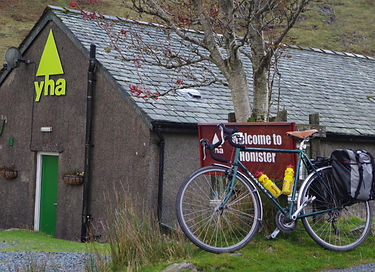
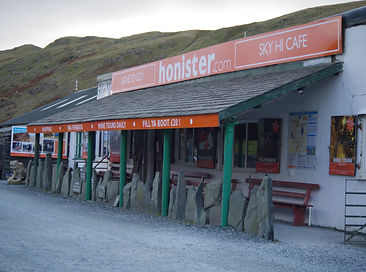
The descent was fast, at times, whilst the brakes were called into action frequently as the first of the tourist minibuses came up. I was pleased I’d come up from the other side; this side definitely felt tougher; it was certainly giving a good challenge to a couple of roadies coming up. Mind you, it could all be mere wishful thinking.
Buttermere revealed a new world of dazzling sunshine and cloudless mountain-tops. Playing leapfrog with a cyclist who was stopping frequently, like me, to take photos and agreeing that we had to make the most of such glorious weather, the eponymous village appeared too soon.
Buttermere village seems to consist of a small church and hall, two pubs, a cafe and a car park, though a spattering of houses help to make this more than just not he a tourist destination. More financial red-lines were crossed in the cafe, for tea and a bacon bap (I'd hoped to maintain a strict budget on this trip, but had blown it on rocky road and fish and chips already).
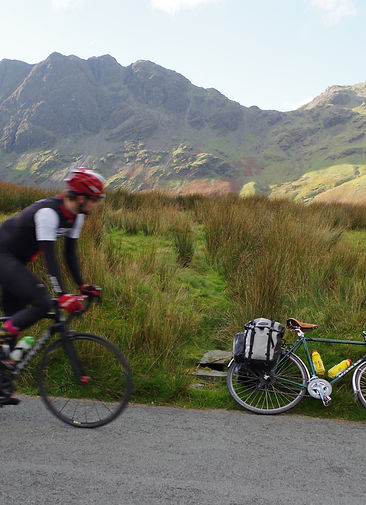
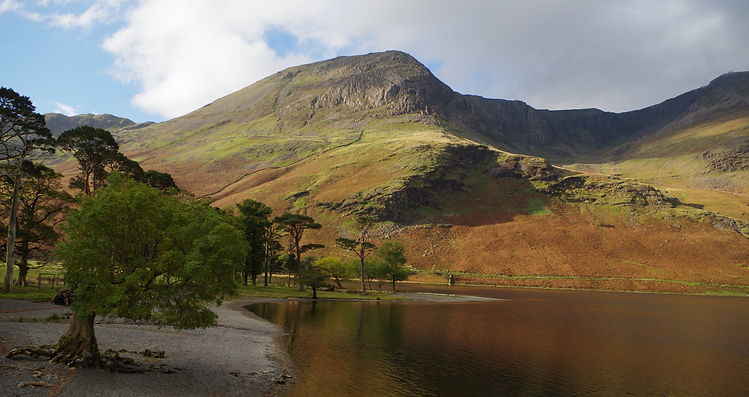
The route in the guide ran from Keswick to Cockermouth - that fine little town just outside the National Park and from there to Eskdale Green. I like Cockermouth, so the decision to cut a corner by heading along the shore of Loweswater and making direct for Lamplugh was not taken lightly. There was plenty of time, but guides are only guides and I wanted to head for Wasdale Head as a later diversion.
From Buttermere to the junction for Loweswater was a magnificent ride. Sporadic groups of tripods, camera with fabulous lenses and their owners, armed with wireless remote controls, waited for the perfect shot of Crummock Water and the fells beyond. Walkers headed for the hills and I belted along with a tail-wind. Why ride so quickly in such scenery? Surely speed should be cut. But no, the blood gets up and the legs get carried away creating a virtuous cycle of endorphins.
Trouble is that there are few bits of the Lake District where the scenery does not get my mind racing - though there are many bits that prevent my legs from responding with commensurate rapidity.
Picking up NCR77 - one of the C2C routes - between Lamplugh and Ennerdale Bridge, a brief diversion took me down a cul de sac to the shore of Ennerdale Water. The fells here were obscured by cloud, making what is usually a spectacular isolated valley, one of the most remote in the Lake District, rather dull.

The Gather in Ennerdale Bridge provided, for a very reasonable fee, cakes and coffee to propel me up the next major ascent. Burn Edge is “popular” with local club cyclists. It is a lengthy, but relatively well-graded climb. The reward for this effort climb is a balcony ride along the flanks of the fells with beautiful views over the coastal strip to the sea and, that day, to the Isle of Man.
The descent seems remarkably long. Holding attention is the nuclear plant at Sellafield. Wainwright pondered why it was that walkers standing amidst the natural glory of the hills, having reached the summit of Sca Fell Pike, all wanted to look at Sellafield - or was it called Calder Hall back then? I fell foul of the same obsession on the way down from Burn Edge. It is irresistible.
At Calder Bridge one joins the A595. Having seen this described in one reporton the Lakes and Dales Loop cycle route, as so busy that the riders decided to get a taxi, I was expecting heavy traffic. There could well be at some times of day and the few lorries that overtook me may be enough to unnerve less experienced cyclists. However, I saw little else in the way of “oil.”

As the head-wind returned, I laboured, once again on minor roads, to Nether Wasdale. Wast Water emerged briefly on the scene, its dour screes dropping into the dark waters. A cloud of misty drizzle engulfed everything. Suddenly the ride to Wasdale Head and its hotel bar seemed less attractive than the ride to Nether Wasdale and the choice of Inns.
Strands or Screes? Opposite each other in Nether Wasdales street, the choice was not easy, but the Strands Inn won. Breaking more financial rules that the average Chancellor of the Exchequer, I succumbed to a pint of ale from their own brewery and waited for the clouds to pass. They didn’t, but the drizzly-mist-that-soaketh-everything did go west, literally.
The pub at Santon Bridge - home to the World’s Biggest Liar competition (not sure if i believe that) - was tempting, but there was a distinct threat that blue sky was about to break through. It was but a short trip to Eskdale Green. Stopping only to try and obey the red light at some roadworks - rather bizarre as one of the workmen waved me through anyway, there was not work of any kind on the road and three guys in hi-viz stood in a lay-by having a chat - I replenished stocks of sweets at the village shop.
The junction by the George, where the road up Eskdale branches away, is guarded by signs warming of dire consequences should one head for Hardknott Pass. Unashamedly, I smiled back when a group of cyclists wished me good luck in getting over the beast. Actually, I did ride to the bottom of the pass, where another set of signs repeats the doom-filled warnings. I’d no intention of going over that evening. I set about and put me feet up at the comfortable YHA Eskdale.
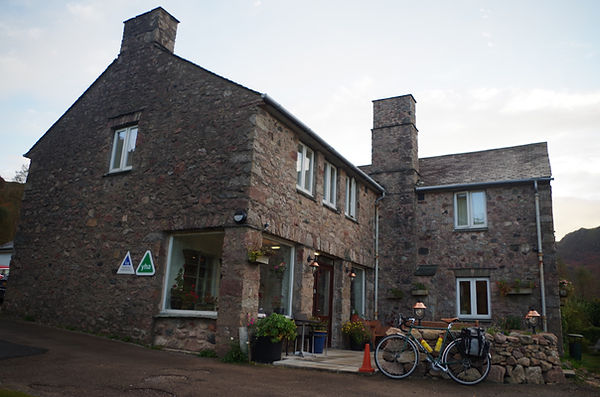
Of course, Richard Barrett’s guide suggests a route back to the environs of Windermere that takes in both Hardknott and its partner in crime, Wrynose, passes. Indeed he adds a little extra by nipping his route over to Langdale (well-worth the views), on the basis that it will give you longer to bask in your glory.
On the other hand, he offers an alternative to those challenges - one with more metres of ascent and several more kilometres of distance - via Birker Fell, The Dunnerdale Fells, Blawith Knott, Consiton Water and Hawkshead. Decisions;
-
I had ridden over Hardknott and Wrynose in the past. Hardknott, in particular, has some lung-busting gradients. Umh. Still, none of us are getting younger and there may come a time when it is not even worthy of contemplation.
-
I had never been along the other route.
-
My train from Windermere did not leave until 18.00. there was no point in “rushing” over Hardknott and Wrynose. Honest, there really was not.
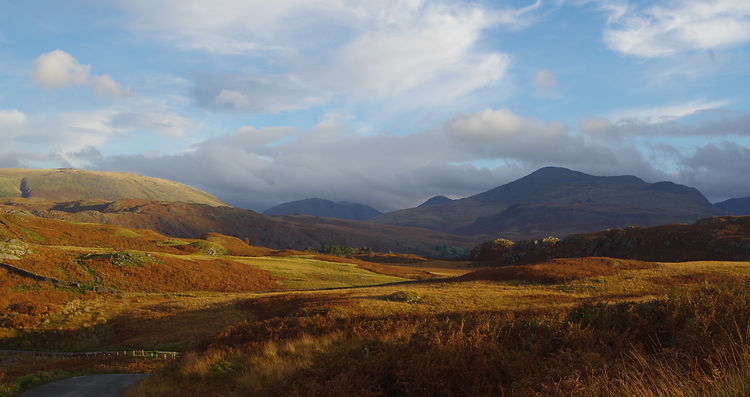
So, Birker Fell in the morning sun; ablaze with browns and orange as the green of the valley was left behind. Still a good old climb, but with views that extend to the top of Hardknott and beyond to the highest hills in England. A surprising miniature rush hour passed to leave the road to myself and a fellow cyclist coming up from Ulpha. He was cussedly following the same guide as me, but in the opposite direction.
Ulpha is in Dunnerdale, the valley of the river Duddon. This is one of the Lake District’s least visited valleys - no lake, but is surrounded by craggy hillsides and is amongst the best. Those who have had enough of mountain passes and have decided that one of Wrynose or Hardknott was sufficient for the day may have run down here after bailing out at Cockley Beck.
Hardknott gets warning signs. Cyclists should be warned that refreshments in Dunnerdale are in proportion to the number of tourist visitors. Try the Newfield Inn, a beautiful sixteenth century inn up the valley at Seathwaite.
The pull up from Dunnerdale offered views back to Uplha and the descent from Birker Fell, soon giving way to a grassy summit and views ahead on the descent to Broughton Mills (pub). Ignoring the main road to Consiton, except for a kilometre or so, I followed the suggested route. What a delight. I’d not have cycled here had I been left to my own devices. A short climb was followed by a joyful free-wheel and then by a gated-road. People do come this way, but not often.
Coniston Water’s east side road is perfect for cycling, with views that get better as one goes. Watching out for tourists at the former home of William Morris and those on a Swallows and Amazons kick, took a bit of care, but the riding is easy and the lakeside is too soon deserted. In my case, I headed for a cafe in Coniston. There is a shared pedestrian-cycle track, hidden behind a hedge, alongside the road. Not really necessary in mid-week October, it probably comes into its own at weekends and in the higher seasons.
This left the little matter of cycling to the ferry and through Bowness to Windermere. Ha. Do not underestimate climbing up Hawkshead Hill. I did, but won’t again. Eventually, belting down to enter the old village of Hawkshead, with its Wordsworthian and historical associations, is always disappointing in some ways. Tourist coaches fill the coach park and tour groups consume large amounts of cake in the cafes - maybe I was just jealous that they had beaten me to the cafes as the rain began to fall, or that last time I visited there wasn’t an Eccles Cake to be had.
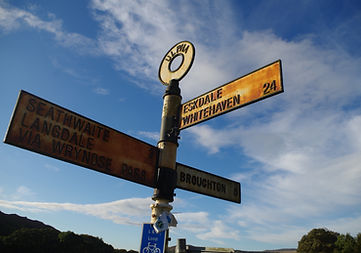


The coaches became fewer as Beatrix Potter’s old stamping ground was passed. The coaches do not use the ferry across Windermere. In fact, that morning, many people seemed to be finding it hard to use. An unpopular new payment machine had been installed. The display screen was hard to read and few seemed to find it as intuitive as the designer may have done.
A guy from Biketreks, in Ambleside, told me that the new machine was an economy measure. We didn’t grouse too much, but got onto cycling chat. Riding as light-weight racer, he was out for a twenty-five mile circuit to fetch a car he had left at a pub three miles from home. Good priorities.
Naturally, we spoke about gradients and hills and the things that make autumn special in the Lake District. He was a little sheepish about asking if I had pushed up the start of Honister, before apologising, once more, for asking. Well, you know the answer. There is no shame in pushing up a hill. It stretches the muscles pedalling uses less; it gives tome to take in views; and I’d be surprised if there was any touring cyclist who has never done it.
But that was where the first part of this tale began.
Information
Visitor information www.golakes.com
Richard Barrett’s guide http://www.cicerone.co.uk/product/detail.cfm/book/778/title/cycling-in-the-lake-district#.WBc2iTKcbJw
YHA Eskdale http://www.yha.org.uk/hostel/eskdale






